
When you’re pregnant, everything you put in your body affects the development of the unborn child in your womb. That’s why it’s important to get proper nutrition during your pregnancy. Mushrooms are flavorful foods that you can add to various drinks and dishes from your tea and smoothies to casseroles and pizza. Mushrooms add flavor and texture to your foods and provide numerous mushroom benefits in pregnancy that you and your baby will need.
Although mushrooms are delicious and full of nutrients, as a pregnant mother you should be very careful not to eat mushrooms that haven’t been properly cooked. Mushrooms can provide you with lots of fiber, vitamins B and D, protein, iron, and antioxidants for you and your unborn child, but some variety of raw and poisonous mushrooms shouldn’t be eaten by a pregnant woman.
Is it safe and healthy to eat mushrooms in pregnancy?
Table of Contents
When you’re pregnant you can eat most edible mushrooms as long as you clean and cook them thoroughly. This is because unwashed mushrooms contain soil that has toxoplasma gondii and raw mushrooms can cause stomach discomfort.
Mushrooms are low in calories and a very good source of quality protein, but not all are edible that’s why it’s important to know the difference. White button mushrooms are very rich in nutrients and contain vitamins, minerals, and trace elements in large quantities. However, some edible mushrooms can also have side effects if you have allergies like diarrhea, vomiting, and nausea. Consuming magic and wild mushrooms can be very dangerous.
Safe mushrooms to eat when pregnant
Most edible mushrooms are safe to eat when you’re pregnant if they’re cleaned and cooked. Here is a list of the most common mushroom species that you can eat when pregnant if you clean and cook them properly.
White mushrooms
The most common variety found everywhere that has a pale white shoot with a spotted top. The shoot contains good fiber you can use to make stews and broth while to top can add a nice flavor to your dishes.
Black fungus mushrooms
They’re available in dried form or Chinese or Asian dishes. Make sure to soak and thoroughly cook them before eating.
Button mushrooms
These are one of the most common mushrooms used in the majority of the culinary dishes.
Enoki mushrooms
They’re popular in salads so you need to pay more attention to ensure they’ve been cooked properly first if you didn’t prepare them yourself.
Chanterelle mushrooms
They often have lots of dirt in and around their gills since they’re picked in the woodlands so clean them properly.
Morel mushrooms
It can be difficult to clean the morels because of their spongy texture and dirt can remain between the gills. The edible strain has a hollow stem and if you don’t cook and clean them properly you might end up with an allergic reaction or stomach upset.
Oyster mushrooms
Sold in specific supermarkets and grocery stores. Avoid eating in large quantities as it can cause stomach discomfort, oyster mushroom supplements since they haven’t been tested if they’re safe for pregnant women, so it’s better to stick to fresh and cooked ones.
Chestnut mushrooms
They look like white button mushrooms the only difference is the brown cap and pink to dark brown gills which makes them look like a darker strain of the button mushrooms. They have a very strong flavor.
Porcini mushrooms
Highly flavorful and are golden in color and are the most expensive mushrooms used in Italian cuisines. If you’re using them dried soak them properly to remove the dirt and grit before cooking.
Mushroom benefits in pregnancy
Vitamin D nutrients
Vitamin D is a very important nutrient during your pregnancy because it’s good in the development of your baby’s teeth and bones and it helps your body to absorb calcium for your intestinal tract. Mushrooms are a significant source of natural vitamin D. Lack of vitamin in pregnant women can lead to fatigue, back pain, bone weakness, depression, and tiredness.
Vitamin B nutrients
B vitamins are also important during your pregnancy because they promote healthy skin, digestion, and nerves and also help you to use up the energy you get from the food you eat. Mushrooms are a good source of B vitamins especially thiamine (B1), riboflavin (B2), and pantothenic acid (B5), niacin (B3).Riboflavin is important in good eyesight, strong bones and muscles, healthy skin, and nerve development. Niacin will help in maintaining good cholesterol levels which is good for the heart, thiamine is for your baby’s brain development and boosts your energy to reduce fatigue, and pantothenic acid will improve your metabolism.
Iron
As the volume of your blood increases during pregnancy, your body will also need more hemoglobin which means your body will need more iron. Mushrooms are a good source of iron to keep you and your baby healthy. Your body can absorb most to the nutritional iron value in mushrooms which helps in hemoglobin formation and red blood cells. This will prevent you from becoming anemic which is very common in pregnant women.
Fiber and protein
Mushrooms are a very good source of protein which is important for the overall growth and development of your unborn child. It’s also important in the development of your placenta and the baby’s support system while in your womb. Mushrooms are also rich in fiber which helps in promoting regular motions. The insoluble fiber is good for your digestion and the soluble fiber will help in regulating your blood sugar absorption, cholesterol, and blood pressure.
Antioxidants and other trace elements
The antioxidants in mushrooms help to boost your immune system which will keep you healthy and free from diseases while you’re pregnant. Mushrooms also contain traces of zinc, selenium, and potassium which are also important in the proper growth and development of your unborn baby.
Final thoughts
Overall, you can enjoy mushrooms during your pregnancy as long as you consume the ones that are safe to eat, clean, and cook them properly. With so many mushroom benefits in pregnancy, you and your baby will have all the nutrients needed to keep you healthy.


